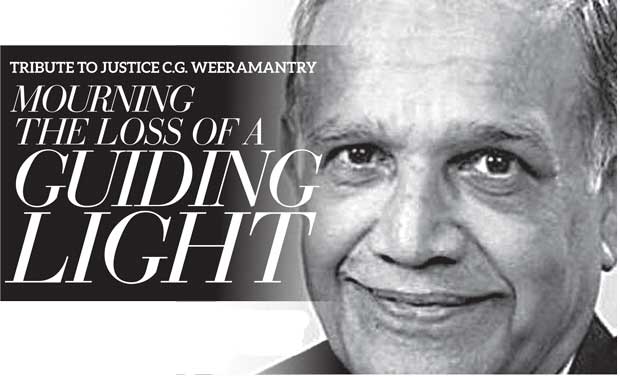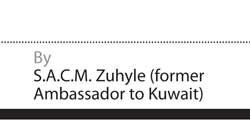
 We mourn the loss of world renowned judge Justice Weeramantry who passed away on Thursday evening. Perhaps, he felt it was the right time to part after profound 90 years of service to humanity. Yet, to those who were near and dear to him, to those who cherished every single second in his presence, his departure was too early. But the world order is given and we cannot escape reality. C.G. will certainly be guided by the angels, with soothing songs, in his journey to the heavens. Let us say our goodbyes to the greatest man of peace in our time, by recollecting some of his great works for humanity.
We mourn the loss of world renowned judge Justice Weeramantry who passed away on Thursday evening. Perhaps, he felt it was the right time to part after profound 90 years of service to humanity. Yet, to those who were near and dear to him, to those who cherished every single second in his presence, his departure was too early. But the world order is given and we cannot escape reality. C.G. will certainly be guided by the angels, with soothing songs, in his journey to the heavens. Let us say our goodbyes to the greatest man of peace in our time, by recollecting some of his great works for humanity.
Judge Weeramantry was undoubtedly one of the most distinguished and respected jurists in the world. His judgments and opinions expressed in various publications, lectures and keynotes at both local and international fora bear testimony to his erudite scholarship and extraordinary ability to interpret the underlying philosophy of legal principles, congruent with the teachings of global religious and cultural wisdom.
C.G. was the very first jurist to communicate religious teachings to the judgments of the International Court of Justice (ICJ). In many of his publications, C.G. argued that this notion needed more acceptance to ensure peaceful co-existence of all religious and cultural groups.
At the ICJ, Judge Weeramantry derived obligations and legal principles from religious and cultural wisdom, and advocated that international adjudication needed more alignment internationally. He therefore extracted and interpreted these cultural notions in his rulings. In many of his opinions, C.G. not only quoted from the rich repositories of Islam, Hinduism, Buddhism and Christianity, but also highlighted the traditions and customs of the Aborigines, Maoris and Incas.
His outstanding contributions to international justice and peace were recognised by the City of Hague in 1998, at the time it celebrated its ‘750th anniversary. Eighteen areas in which the city excelled over the 750 years were chosen and individuals recognised in these areas. Hence, it was Judge Weeramantry who was chosen as the most prominent personality to have contributed to international justice. Accordingly, a booklet was published on the 18 personalities selected and their contributions exhibited for a month at the city hall.
Justice Weeramantry always feared the outbreak of a nuclear war. Needless to say the world is not strong enough to undergo such devastation.
When the UN General Assembly appealed to the ICJ for an opinion on the legality of the use or threat of nuclear weapons, C.G. made a dissenting opinion to condemn nuclear weapons outright, and considered this act totally illegal in all circumstances. Henceforth, his opinion is regarded as a leading exposition of the illegality of nuclear weapons, and its resultant environmental damage to current and future generations for thousands of years to come.
More often than not, it is C.G.’s authority that is cited when concerns of illegality and environmental damage caused by nuclear weapons table for discussion. In August 2016, a special session was held in Japan where Justice Weeramantry was invited to be the Chief Guest to commemorate the judgment on the use of nuclear weapons.
With regards to the environment, C.G. has rendered yeoman service to highlight the significance of environmental law as a rapidly-developing branch of international law. In the words of Professor Philippe Sands, Global Professor of Law at the New York University School of Law: “Judge Christopher Weeramantry has made a singular contribution to the development of modern environmental law… If international environmental law has been ‘mainstreamed,’ then, much of the credit must go to Judge Weeramantry.”
C.G. has also written on the teachings regarding the environment of Hinduism, Judaism, Buddhism, Christianity and Islam. One such masterpiece is his book ‘Tread Lightly on the Earth: Religion, The Environment and the Human Future.’
In May 2016, Judge Weeramantry was chosen to deliver the keynote address on the occasion to commemorate the 800th year of Magna Carta. He was also emeritus Professor of several universities worldwide.
Erudite Weeramantry never failed to take the maximum out of his prowess. He wrote two pioneering works on the legal content of Islam and Christianity, referring to the specific teachings related to trusteeship of the environment. The books ‘Islamic Jurisprudence: An International Perspective’ and ‘The Lord’s Prayer; Bridge to a Better World’ stand tribute to this.
The United Nations Environmental Programme (UNEP) appointed Judge Weeramantry as the Chairman of a committee of judges to draft a manual of international environmental law for the use of the personnel of the judiciary worldwide. This was necessitated by the fact that many judges were now called upon by their domestic jurisdictions to decide matters in the developing area of environmental law and often did so without any knowledge on the latest developments in the subject area.
When the US celebrated its bicentennial anniversary in 1976, a world congress was held on Equality and Freedom – the underlying themes of the US Constitution. Three presentations on equality and freedom were arranged from the standpoints of the western, communist and third world, and Judge Weeramantry was invited to make the presentation for the third world. His speech was serialised in various journals including The Asiaweek and Christian Science Monitor, and was described by a reader of Asiaweek of April 15, 1977 as ‘A Magna Carta for the Third World.’
C.G. has also been a pioneer in seeking to prevent the enormous powers of modern science and technology from damaging the environment. Outstanding futurist Sir Arthur C. Clarke often described C.G. as ‘The prophet of the space age.’ In his foreword to Judge Weeramantry’s work in protecting human rights in the age of technology, he observed:
“This monumental work deserves a wide readership, because it is concerned with nothing less than the survival of humanity and necessity of making the right use of the awesome new powers that science and technology has given us… So I am happy to see Judge Weeramantry outlining many of the steps that must be taken if we are not to follow the dinosaurs into oblivion.”
No more need to be said to highlight the calibre of this gentleman, or even to establish his pre-eminence as a scholar and jurist. He is a man who has done his outmost for the sustainable development and protection of the environment for many generations to come. Sadly, the world has lost a guiding light.
Post Disclaimer | Support Us
Support Us
The sailanmuslim.com web site entirely supported by individual donors and well wishers. If you regularly visit this site and wish to show your appreciation, or if you wish to see further development of sailanmuslim.com, please donate us
IMPORTANT : All content hosted on sailanmuslim.com is solely for non-commercial purposes and with the permission of original copyright holders. Any other use of the hosted content, such as for financial gain, requires express approval from the copyright owners.
 Sri lanka Muslims Web Portal Sri Lanka Muslims News Center
Sri lanka Muslims Web Portal Sri Lanka Muslims News Center
 Donate
Donate

